Microsoft CityNext is part of China’s smart urbanization

Smart urbanization—helping cities grow in more sustainable, environmentally sound ways—depends on a deep understanding of how our resources are being used. With their burgeoning populations and incredible economic growth, cities throughout China can help foster both economic growth and ecological balance.
I am in Beijing this week to take part in the
Eleventh International Conference on Green and Energy-Efficient Building & New Technologies and Products Expo, presented by the Ministry of Housing and Urban-Rural Development. I am looking forward to sharing what Microsoft CityNext is doing in China and to exploring in more detail how China, with its high migration rate from rural to urban areas, has become a leader in city innovation.
At Microsoft, we have a long-standing commitment to sustainability practices in our operations. Not only are we implementing a “city of the future” at our US headquarters by making our buildings more environmentally sound, we are also working with our suppliers, and internally, to make our sourcing, purchasing, and daily operations carbon-neutral. In addition, Microsoft is committed to developing technology products and solutions that enable individuals, businesses, communities, and nations to achieve their environmental goals and improve sustainability.
Microsoft CityNext is a companywide initiative based on solving significant city-scale problems by delivering the world’s best software solutions from Microsoft partners. CityNext is built on the understanding that solving real-world problems across energy, pollution, water, health, public safety, education, enforcement, and many other core infrastructure areas is a real challenge for all cities. We view our role as ensuring that customers can take advantage of the great advances in mobile and cloud technology to empower cities to achieve economic growth and ecological balance. By bringing the best-of-breed solution to each situation, Microsoft and its partners can help a city innovate at its own pace; it can tackle one, two, three, or up to 40 areas over a timeline that works best for that city.
In China, we’ve been active in the research and technological development that provides the knowledge base for smart urban growth strategies. Microsoft Research Asia invested in delivering visualization and urban informatics, providing a technological foundation for collecting and analyzing the right data to inform decisions and actions. Our researchers have published papers on using big data to understand urban energy. One intriguing scenario is about mining data patterns in the daily operation of Beijing’s taxis, which could provide insights that can help optimize routes, promote fare-sharing, reduce traffic congestion, limit carbon emissions, and ultimately improve the quality of life.
We’ve also worked with local governments and business leaders to improve technological infrastructure, provide support for startup businesses, automate government processes, and promote travel and tourism in places including Xixian New District of Shaanxi Province, Hainan Province, Wenzhou, Wuhan, Yangzhou, and Zhuzhou. There are now unprecedented volumes of data available on everything from commuting patterns to building energy use to how people react to changes in the weather. By using mobile technology and cloud data platforms, civic leaders and citizens can take advantage of that data to create innovative, intelligent solutions that solve real problems and improve daily life for millions of people.
China’s cities are growing at a tremendous rate, with more than 250 million more people expected to settle in cities within the next 10–15 years. A similar increase in urban populations is expected worldwide, and so is the demand for services and resources. Big data, mobile technology, and the cloud will be crucial to solving the problems and creating the opportunities that will transform cities in the future. But just as important—perhaps more important—will be the people who come together to create that urban future.




